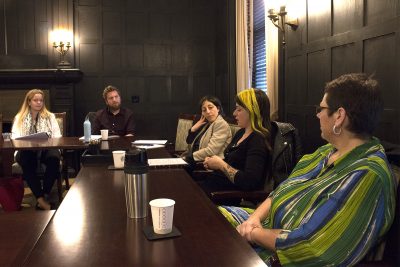
Approximately 10 people gathered in the Boston University Frederick S. Pardee School of Global Studies Wednesday to listen to a panel of three representatives from organizations combating human trafficking in Boston.
The panel was one of several events hosted by the Pardee School’s Initiative on Forced Migration and Human Trafficking for Human Trafficking Education Week. Jeffrey Nicklas, a graduate intern with FMHT, opened the discussion.
“This is a panel of local organizations talking about their work with human trafficking and what they do to support people that have experienced that,” Nicklas said. “We just wanted to have kind of an informal discussion format.”
The panelists each briefly introduced their organizations, and then spent the rest of the panel answering questions from the students and organizers.
Naomi Azar, a clinician from Project REACH, an organization focused on promoting trauma-informed care for survivors as well as professional trainings, spoke about how multifaceted of an issue human trafficking is and how much more education needs to be done in that area.
“We try and take a holistic approach and think about how these experiences impact a person’s ability to actually move forward, even once they’re out of the actual trafficking situation,” Azar said. “We also offer trainings and talks around the country to help people understand these things.”
She spoke about how immigration issues in the current political climate can actually affect many day-to-day issues.
“There’s a way in which there’s added vulnerability because of our policies around immigration, but of course with [President Donald] Trump at the helm, it’s even more of a question about how individuals will feel when they’re faced with whether or not they can seek help from authorities,” Azar said. “Because of the criminalization of prostitution in our country, oftentimes individuals who are being sexually exploited don’t have a sense that they have rights.”
Alexandra Feigel, a life coach from Roxbury Youthworks, Inc.’s GIFT program, spoke about the issue of trafficking from a youth perspective, which are the clients that her organization primarily represents.
“These youth don’t necessarily see themselves as exploited, they don’t necessarily see themselves as victims,” Feigel said. “Talking to them, you want them to feel empowered, you don’t want to be like, ‘People are taking advantage of you, and you’re not as independant as you think,’ but we’re also trying to change that viewpoint for them.”
She said many girls need help over a long period of time, and there is often no easy fix for the depth of problems they face.
“There’s no, ‘You get this case and you go one, two, three and they’re good,’” Feigel said. “It’s very individualized, it’s a very delicate dance. It’s a balancing act for sure.”
Heather Thornburg, the program director of Amirah, a faith-based organization helping women recovering from human trafficking, spoke about the ways in which women in human trafficking are marginalized when trying to seek help.
“Women come to us with incredible physical need, and we oftentimes take them to the hospital,” Thornburg said. “If we don’t go with them, they don’t get the services that they need, because they’re seen as drug seeking or strictly there because of the substance use piece, and they don’t have the ability to speak up for themselves in ways that are effective.”
She said both the big picture and more personal sides of their work are equally important.
“Our role to come alongside them is just as important in the impact of the women’s lives as it is to connect with providers or to see things from a larger perspective,” Thornburg said. “We’re trying to keep that larger perspective and that personal perspective in tandem, just having someone willing to go alongside her and advocate for her in that way has been huge in terms of succes.”
Several students said they thought the panel was informative, especially for people studying international relations.
Marietta La Barbera, a freshman in Pardee, said human rights issues like this interest her, and she came to the discussion to learn more.
“I came to the panel because I’m an IR major, and this is kind of the track I want to take,” La Barbera said. “I thought it was really informative about the daily lives of these sorts of organizations.”
Andrea Van Grinsven, a senior in Pardee, said she appreciated the variety of perspectives that the panel offered.
“I’m also an IR major, and I’ve studied a lot on migration and I’ve worked a little bit with human trafficking,” Van Grinsven said. “I thought it was really interesting how the panel had a lot of diverse experiences of working with international context, a youth context and a local context, and I thought it was really valuable to have that nuance.”
Alicia Ireland, a sophomore in the College of General Studies, said the panel got her interested in potentially volunteering or working with human trafficking victims in Boston.
“I’ve been really interested in this lately, I actually signed up for a human rights class this summer,” Ireland said. “I’ve been wanting to get involved with finding a way to help child brides who have been trafficked around the world, so I saw this in my email and decided to come. I thought it was really helpful. It’s nice to know there are places you can access and volunteer right here in Boston.”



















































































































